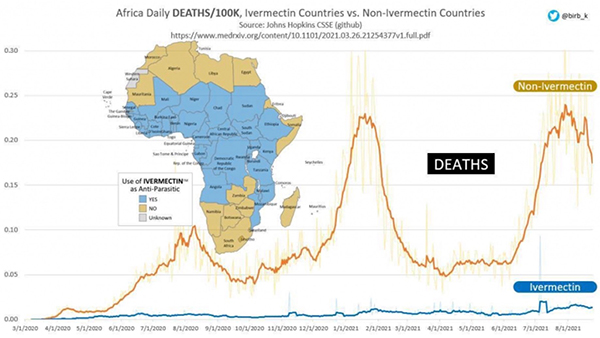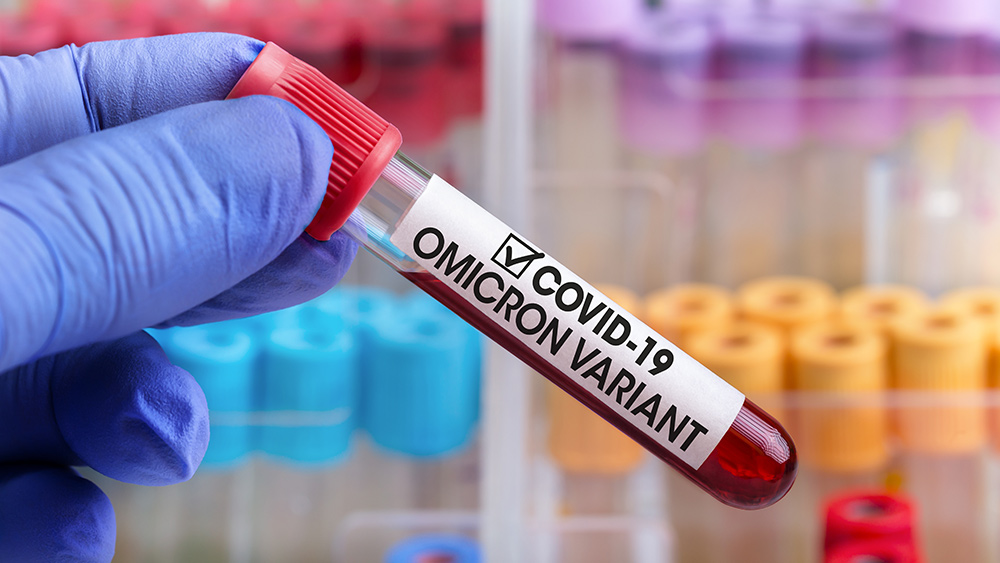Why does Africa have such low rates of severe covid-19 infection and mortality?
09/10/2021 / By Lance D Johnson

In 2015, the Nobel Prize in Physiology and Medicine was awarded to William C. Campbell from the US, Satoshi Omura from Japan, and Youyou Tu from China. The three scientists discovered natural-based remedies to treat parasitic infections that cause malaria, river blindness (onchocerciasis) and elephantiasis (lymphatic filariasis). These infections plague over a hundred million people annually, especially throughout Africa, where living conditions are less favorable.
Youyou Tu was able to isolate and synthesize artemisinin from the herb, sweet wormwood (Artemisia annua). The discovery has led to a novel therapy against malaria. William Campbell and Satoshi Omura cultivated dozens of strains of streptomyces bacteria and isolated avermectin. Renamed ivermectin, this bacterium was made into a blockbuster drug and become a novel therapy against roundworm infections. Today, ivermectin is showing promise for covid patients, and even inhibits SARS-CoV-2, in vitro.
Ivermectin and artemisinin revolutionize medicine in Africa
Ivermectin and artemisinin have revolutionized the quality of life for millions of people living in Africa. The Nobel committee in Stockholm said artemisinin and ivermectin “treatment is so successful that these diseases are on the verge of eradication, which would be a major feat in the medical history of humankind.”
Now that these medicines are being used as front-line treatments in certain areas of Africa, fewer people are suffering from severe infections, which includes respiratory infections like covid-19. In April 2020, the journal Antiviral Research published an article promoting ivermectin because it showed early success in treating SARS-CoV-2. Since then, there have been 75 peer reviewed studies on ivermectin, with promising results. In 63 prophylaxis studies, ivermectin showed an 86% improvement for covid patients. In 45 peer reviewed early treatment studies, ivermectin showed a 70 percent improvement for covid patients.
Ivermectin drastically lowers mortality rate and case count for covid-19
The National Library of Medicine published a bombshell report in October 2020 showcasing all the countries that participated in the African Program for Onchocerciasis Control. Some countries took part in an “intensive Ivermectin mass campaign carried out to control onchocerciasis.” Other countries did not take part. The report compared covid-19 mortality and infection rates among these countries. The countries that deployed ivermectin had a peculiarly lower rate of infection — eight percent lower — but most importantly, these nations had a 28 percent lower covid-19 mortality rate! The mortality rate could be further reduced because this study represents incidental use of ivermectin, prescribed for something entirely different. What would the results be if ivermectin was prescribed early and often as a direct therapeutic for covid-19 and other respiratory infections?
Japanese researchers were curious about the ivermectin connection. They investigated thirty-one “onchocerciasis endemic” countries that used “community-directed treatment with ivermectin.” The researchers compared their COVID-19 statistics with 22 “non-endemic” countries. The mortality rate was “significantly less” in the thirty-one countries that used ivermectin for onchocerciasis. In the countries where ivermectin was used frequently, there were 134.4 cases per 100,000 people and the number of deaths was 2.2 per 100,000. In countries that do not use ivermectin, there are 950.6 cases per 100,000 and 29.3 deaths per 100,000. This realization prompted Tokyo’s Medical Association Chairman to hold a live press conference recommending ivermectin to all doctors and for all covid-19 patients.
FDA hesitant to regulate, dispense and recommend ivermectin, despite overwhelming evidence of efficacy
The U.S. Food and Drug Administration (FDA) has not moved forward with clinical studies on ivermectin, despite the drug’s historic efficacy against other pathogens. The agency maintains: “The FDA has not reviewed data to support use of ivermectin in COVID-19 patients to treat or to prevent COVID-19.”
If regulatory agencies were to admit that there are effective antiviral treatments that target viral proteins, then there would be no legal justification to grant emergency use authorization to experimental vaccines. But with ivermectin, early treatment saves lives. The drug is not only an over-the-counter veterinary-grade treatment for infections in horses. At the right dose and formulation, it can be used successfully to treat infections in humans. The FDA and other regulatory agencies, however, are hesitant to approve, regulate and dispense this medicine in a form that patients and hospitals can rapidly deploy with efficacy. Why is that? Shouldn’t a life-saving, affordable, effective medicine be a priority? With proper dispensing, ivermectin could be used in treatment protocols, without the risk of overdose.
Using treatments such as ivermectin is just the tip of the iceberg. There are several anti-inflammatory, anti-viral compounds that can improve survival rates and lessen suffering in medical systems around the world, if only the powers that be allowed it.
Sources include:
PubMed.gov [1]
PubMed.gov [2]
PubMed.gov [3]
PubMed.gov [4]
MedRXIV.org [PDF]
Tagged Under: Africa, alternative medicine, anti-parasitic, anti-viral, artemisinin, conspiracy, covid-19, early treatment, FDA, infection rates, ivermectin, mortality rate, Nobel Prize, outbreak, pandemic, research, superbugs, treatment plans
RECENT NEWS & ARTICLES
COPYRIGHT © 2017 OUTBREAK NEWS





















